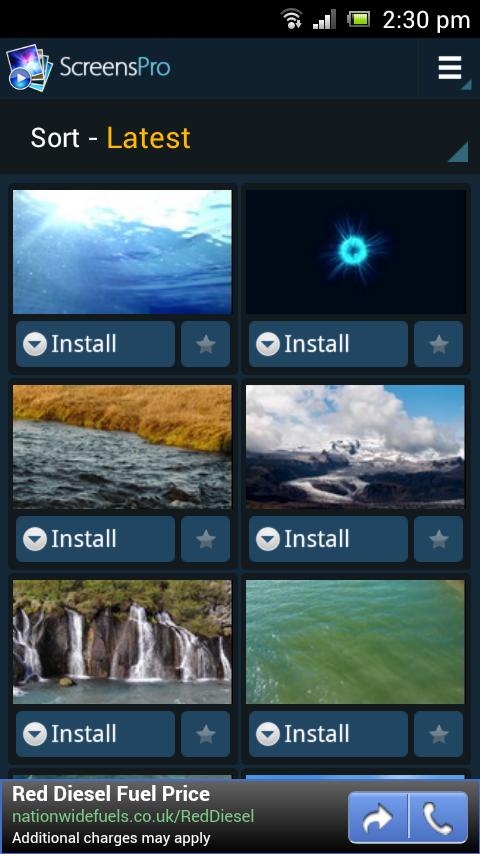Video Wallpaper Android Biography
Source (google.com.pk)
Android is an operating system based on the Linux kernel, and designed primarily for touchscreen mobile devices such as smartphones and tablet computers. Initially developed by Android, Inc., which Google backed financially and later bought in 2005, Android was unveiled in 2007 along with the founding of the Open Handset Alliance: a consortium of hardware, software, and telecommunication companies devoted to advancing open standards for mobile devices. The first Android phone (HTC Dream) was sold in October 2008.
The user interface of Android is based on direct manipulation, using touch inputs that loosely correspond to real-world actions, like swiping, tapping, pinching and reverse pinching to manipulate on-screen objects. Internal hardware such as accelerometers, gyroscopes and proximity sensors are used by some applications to respond to additional user actions, for example adjusting the screen from portrait to landscape depending on how the device is oriented. Android allows users to customize their home screens with shortcuts to applications and widgets, which allow users to display live content, such as emails and weather information, directly on the home screen. Applications can further send notifications to the user to inform them of relevant information, such as new emails and text messages.
Android is open source and Google releases the source code under the Apache License. This open-source code and permissive licensing allows the software to be freely modified and distributed by device manufacturers, wireless carriers and enthusiast developers. However, most Android devices ship with additional proprietary software. Additionally, Android has a large community of developers writing applications ("apps") that extend the functionality of devices, written primarily in the Java programming language. In October 2012, there were approximately 700,000 apps available for Android, and the estimated number of applications downloaded from Google Play, Android's primary app store, was 25 billion. A developer survey conducted in April–May 2013 found that Android is the most popular platform for developers, used by 71% of the mobile developer population.
Android is the world's most widely used smartphone platform, overtaking Symbian in the fourth quarter of 2010. Android is popular with technology companies who require a ready-made, low-cost, customizable and lightweight operating system for high tech devices. Despite being primarily designed for phones and tablets, it also has been used in televisions, games consoles, digital cameras and other electronics. Android's open nature has encouraged a large community of developers and enthusiasts to use the open-source code as a foundation for community-driven projects, which add new features for advanced users or bring Android to devices which were officially released running other operating systems.
As of November 2013, Android's share of the global smartphone market, led by Samsung products, has reached 80%. The operating system's success has made it a target for patent litigation as part of the so-called "smartphone wars" between technology companies. As of May 2013, 48 billion apps have been installed from the Google Play store, and as of September 3, 2013, 1 billion Android devices have been activated.
The open and customizable nature of Android allows it to be used on other electronics aside from smartphones and tablets, including laptops and netbooks, smartbooks,[ smart TVs (Google TV) and cameras (Nikon Coolpix S800c and Galaxy Camera). In addition, the Android operating system has seen applications on smart glasses (Google Glass), smartwatches, headphones, car CD and DVD players, mirrors, portable media players, landline and Voice over IP phones.Ouya, a video game console running Android, became one of the most successful Kickstarter campaigns, crowdfunding US$8.5m for its development, and was later followed by other Android-based consoles, such as Nvidia's Project Shield — an Android device in a video game controller form factor.
In 2011, Google demonstrated "Android@Home", a home automation technology which uses Android to control a range of household devices including light switches, power sockets and thermostats. Prototype light bulbs were announced that could be controlled from an Android phone or tablet, but Android head Andy Rubin was cautious to note that "turning a lightbulb on and off is nothing new," pointing to numerous failed home automation services. Google, he said, was thinking more ambitiously and the intention was to use their position as a cloud services provider to bring Google products into customers' homes.
In August 2011, Parrot launched the first car stereo system powered by the Android platform, known as Asteroid and featuring voice commands. In September 2013, Clarion released more advanced car stereo systems powered by the Android platform, known as AX1 and Mirage, running Android 2.3.7 and 2.2 (Gingerbread), respectively, and featuring GPS-based navigation, 6.5-inch screen and various options for wireless data access.
Video Wallpaper Android

Video Wallpaper Android

Video Wallpaper Android

Video Wallpaper Android

Video Wallpaper Android

Video Wallpaper Android

Video Wallpaper Android

Video Wallpaper Android

Video Wallpaper Android

Video Wallpaper Android

Video Wallpaper Android
No comments:
Post a Comment